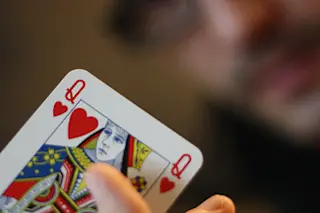Photo: flickr/Ulf LiljankoskiCan you really get better at poker? How much skill does it take to win? In this 'quasi-experimental' study, the researchers set out to answer these questions. To do this, they had both expert and novice poker players sit down to fixed games, receiving prearranged card hands. This allowed the authors to test whether skill or chance could predict the outcome of the game. The results revealed that although the cards dealt pretty much predicted the winner, skill was important for reducing losses when players are dealt a bad hand. So, if you are a beginner, you'd better have beginner's luck or you might be broke by the end of the game.Is poker a game of skill or chance? A quasi-experimental study. "Due to intensive marketing and the rapid growth of online gambling, poker currently enjoys great popularity among large sections of the population. Although poker is legally ...
Is poker a game of skill or chance?
Explore if poker is a game of skill or chance in our quasi-experimental study that uncovers the influence of card distribution.
More on Discover
Stay Curious
SubscribeTo The Magazine
Save up to 40% off the cover price when you subscribe to Discover magazine.
Subscribe













